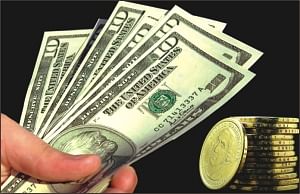Dollar back in vogue

The US dollar is back in vogue and has put pressure on other major currencies euro and pound sterling and yen. Good news for the importers as they will find their imports cheaper.
But it is worrying for the exporters. They may face hurdles in maintaining competitive edge unless the taka weakens. Chances appear dim in near future.
Until August 26, dollar extended gains against euro and other major currencies like British pound and yen as the worries of economic recession in euro zone and other major economies such as Japan deepen on weak data.
The greenback, which was traded at $1.60 against a euro last month, stood at $1.4722 yesterday from $1.4653 the previous day amid profit taking by investors. A rebound in oil prices, persistent concern about the US economy also helped trigger the bout of profit-taking.
The US currency also lost against yen.
The taka remains stable against the dollar after gaining marginally in the third week of July. Taka added 0.42 percent to Tk 68.51 at the end of June 2008 over the end of June last year.
“Strengthening of US dollar means major currencies like euro, pound and yen are getting cheaper which would lower the cost of imports of capital machinery from those countries,” said Mamun Rashid, a money market analyst.
So the possibility of a surge in the import of capital machinery, which declined 8.4 per cent last fiscal, cannot be ruled out, although worries are there about uncertainty in the political arena relating to the promised parliamentary election within this year.
Domestic consumers should also get a respite from the high prices of essentials such as edible oil, the price of which is also on the decline in the global market.
Thanks to the recent slide in oil price that has helped ease policy makers' tension much with a comfortable reserve, supported by healthy growth of remittance and export. Oil however gained yesterday.
“Unless there is a change in the external balance situation, there could be no major impact,” said MA Taslim, chief executive officer of Bangladesh Foreign Trade Institute.
Inflow of remittances, hard-earned money of about five million Bangladesh people abroad, remains robust and it touched a record at US$7914.78 million in the fiscal year (FY) 2007-08, up over 32 percent from $ 5978.5 million a year ago.
Exports grew about 16 percent to $ 14,110.80 million last fiscal from $ 12,177.86 million in FY 2006-07, thanks to exporters' continued efforts to improve competitiveness in the global market.
Given the present trend of pressure for imports, bankers say, there is fewer possibility of a sharp surge in import payments that marked 26 percent rise to $20212.75 million last fiscal.
“I don't see any sudden change in the exchange rate in the foreseeable future,” Taslim added.
Until Tuesday, the dollar also pushed other currencies such as Indian rupee down which may help cut import costs of rice and onion from India, Bangladesh's second biggest import destination.
“Import from non-dollar countries will slightly be better,” observed a former central bank analyst, who preferred not to be named.
Unless there is a reduction in the oil price, raised up to 37.5 percent in July this fiscal, the possibility of a dampening effect on the inflation expectation seems to be marginal.
Exporters, mainly garment and knitwear makers, did not complain last fiscal much about the appreciation of taka as they enjoyed competitive advantage over the appreciation of yuan and other currencies.
But the recent gain of the dollar over euro on recession fear in the euro zone, which consumes over half of Bangladesh's exports, may affect knitwear, footwear and shrimp exporters.
It will also be difficult for both the groups exporting against euro and dollar. The traders exporting against euro will find their earnings lower.
Nasim Manzur, managing director of Apex Adelchi Footwear, one of the leading footwear exporters to Europe, said weakening of euro might hurt the earnings of those who are exporting to the EU.
Those exporters who are exporting against dollar may also be affected because Europeans will find dollar more expensive due to weak euro.
“It's not a good news. The gain of dollar will increase European buyers' import costs,” said Fazlul Hoque, president of Bangladesh Knitwear Manufacturers and Exporters Association. “But the export earnings from the USA may be better.”
The pressure on exporters also increases as the value of various Asian currencies such as Vietnamese dong and Sri Lankan rupee is depreciating, which, Mamun Rashid says, might result in increased competition in export arena.
“We need to maintain our exchange rate competitiveness or encourage the exporters in any other way, to ensure they compete well with their counterparts in Vietnam, Cambodia or Sri Lanka,” Rashid said.
Exporters also expect a cut in the value of taka against dollar to cover the gap.
The central bank has yet to take any decision.
“We are keeping close eye on the movement of the greenback…The gain of the dollar may not sustain as the US economy has yet to regain,” a senior official of the central bank said.
The official expects that there would be no major imbalance. “Export may be affected a bit but imports will be cheaper and put a dampening effect on inflation,” he said.

 For all latest news, follow The Daily Star's Google News channel.
For all latest news, follow The Daily Star's Google News channel. 




Comments